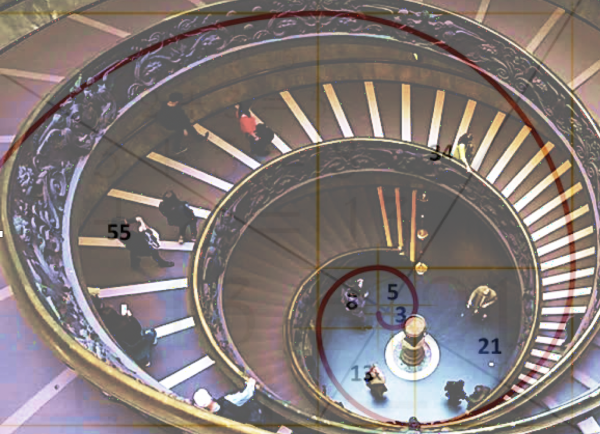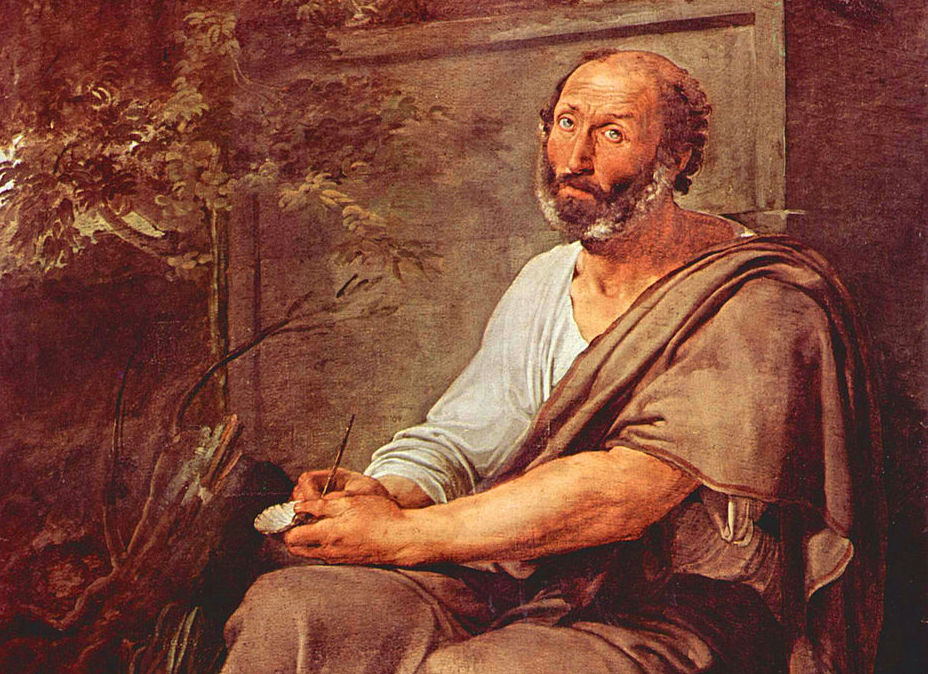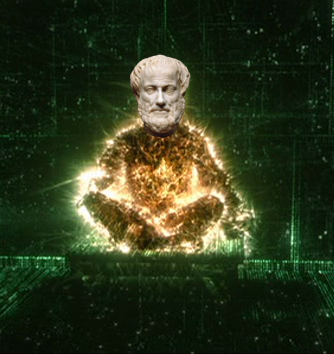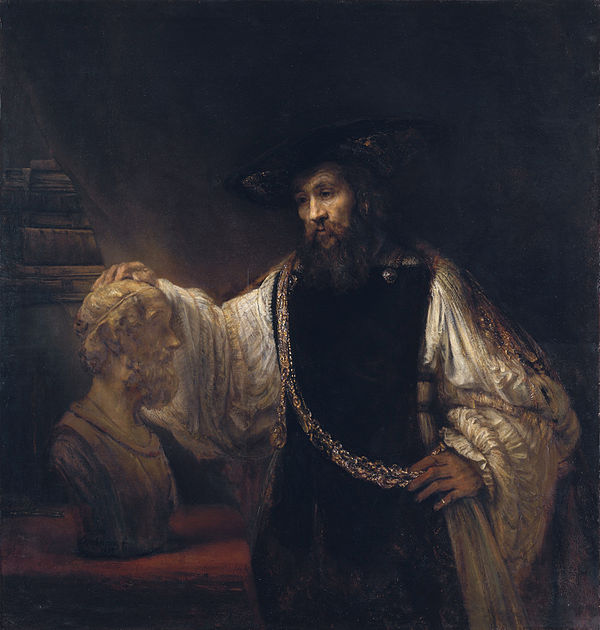The foundational truths are written into our experience. We just have to remember them.
One More for the Road
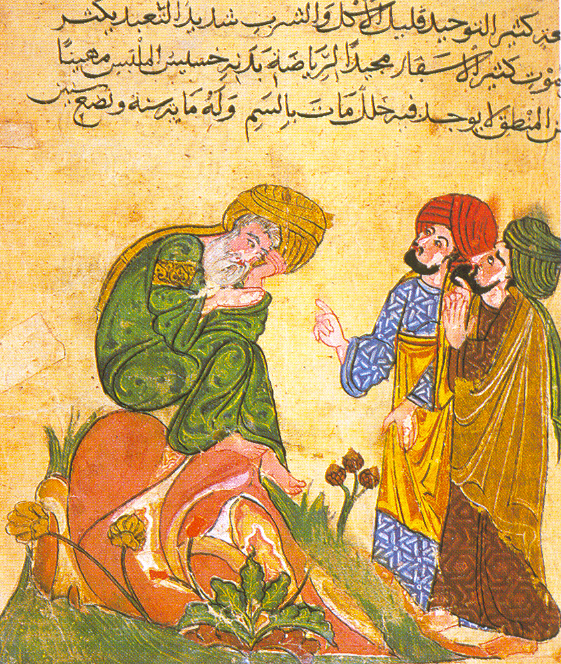
What is the Bedrock of Being? (A Reply to Alex Priou.)
I thank Alex Priou for taking time to read my essay Natural Numbers, Biology, and Natural Right and to respond with an essay of his own. I will, however, differ with the abstract argument that Priou advances, as best as I understand it, with a concrete, and cautionary, tale.
But first, some fundamentals.
In my essay, I discussed prescientific experience such as that of temporality (“before” and “after”), space (“here” and “there”), conditionality (“if-then”), and the immediate point of disagreement, the noun (“unity”).
For my tale—for any tale, mine, Priou’s, or whosever—to be intelligible, these prescientific concepts and others must be taken as given. Criticism of these concepts must be suspended in the telling; only when we are finished with the telling can we pass judgment as to whether that suspension can be lifted intelligently.
Al-Ghazali and the End of Islamic Philosophy
In the 11th century, Abu Hamid Al-Ghazali penned the Incoherence of the Philosophers critiquing the works of the falasifa, medieval Islamic philosophers of the school of Plato or Aristotle.
Examining the thought of the falasifa, Al-Ghazali maintained that differences in the linguistic structures of Arabic and Greek showed these structures to have an arbitrary character that divorced the logos from any possible underlying structure of being and change.
This implied that Greek rationalism grounded itself in an arbitrary logic haphazardly embedded in the grammar of the Greek language. It followed that Greek arguments on the interpretation of experience were incoherent, because the arguments were not grounded in a permanent non-arbitrary framework but in the accidental grammatical structures of temporality, conditionality, and unity embedded in the Greek language.
Al-Ghazali resolved this incoherence with a science rooted in an alternative permanent non-arbitrary framework. In rough terms, God revealed the truth, His will, in several revelations, first to the Jews in Hebrew, then to the Jews and gentiles alike in Aramaic and Greek, and then finally and comprehensively to all the world through his Prophet Muhammed in the language of Arabic.
The substance of the final Arabic revelation superseded the substance of the prior revelations in Hebrew, Aramaic, and Greek. Moreover, the prior revelations themselves were superseded linguistically by Arabic, a language made non-arbitrary only by God’s selection of it for the final revelation. Points of reference within the older revelations or from the observation of nature could not inform interpretation of the final Arabic revelation, which became the exclusive source code, as it were, for a scientific understanding of the whole.
This solved for Al-Ghazali the problem Priou has raised: What is One?
The oneness of God, and His act of pure will in choosing Arabic for his final revelation through the Prophet Mohammed, provided the meaning of unity and any particularization thereof. All interpretation, all science, became sacred and jurisprudential science—interpreting the whole through the final Arabic revelation—by reference to that revelation and not to any experience outside of it. Al-Ghazali was so forceful in demeaning the falasifa that their thought became thoroughly marginalized.
Before Al-Ghazali triumphed over the classical rationalism of the falasifa, the Islamic world had experienced disciplined, steady advances in natural science, practical sciences such as navigation, and mathematics. After Al-Ghazali’s triumph, the advances of the natural and practical sciences of the Islamic world slowed, nearly to the point of cessation.
Were these events conditionally related such that if one then the other?
Scholasticism’s Universalism
Regardless, the story does not end there. Soon after the ascendance of Al-Ghazali in the Islamic world, the texts of Avicenna (Ibin Sina), Averroes (Ibin Rushd), and other falasifa made their way to the West. Through these scholars, Aristotle’s account of experience got hold of the medieval Christian mind.
The proliferation of Christian Averroists caused concern within the Church that scholars were abandoning their Christian faith in favor of the experience of nature, leading to the Condemnation of 1210 prohibiting the reading of Aristotle, and the Condemnations of 1270 and 1277 identifying certain Averroist and Aristotelian tenets as heretical.
In parallel, a reconciliation of Christianity and Aristotle ensued principally through St. Thomas Aquinas, which installed, with some alteration, many fundamental concepts of being and causation first developed by Aristotle into Christian doctrine, moderating the latter and insulating the former from persecution.
The Thomistic synthesis had certain linguistic features. Aquinas could not read Greek and was not likely competent in Hebrew or Aramaic. Aquinas relied on the translations of William of Moerbeke for Aristotle and accessed Holy Scripture through the translated Latin Vulgate Bible (Biblia Sacra Vulgata). An authoritative description of the whole based upon an account of the experience of the natural world translated from one language into another, and revelation translated from at least three languages into one, implies certain important assumptions.
While math, as I note in my essay, is often understood as a universal language, Christian medieval thought, from which modern Western thought emerged, assumed the description and logic of the account of experience, natural and supernatural, could be communicated across linguistic structures without a loss of meaning. This assumption reflected confidence that the question “what is one?” could be adequately understood for purposes of science, natural as well as political.
If a man could speak of a thing or a unity in one language and another man not sharing that language could understand it adequately in translation, then the concepts translated reflected a common experience, the basis of which is either an objective grasp of a shared reality existing outside the speakers, or an astonishing coincidence.
Following the introduction of Aristotelian natural philosophy into the doctrinal West, the West became intellectually more flexible and emerged through Scholastic thought, for example, in the works of Roger Bacon, who emphasized empiricism, and William of Ockham, who gave us Ockham’s Razor. A great eruption of scientific understanding in kinematics, dynamics, and logic followed in the late medieval period.
Scholasticism and Its Discontents
Scholastic thought, however, is not without its problems. The marriage of Aristotelian natural philosophy and Christian revelation modified certain open-ended observations about the whole and experience into doctrinal conclusions that frustrated further investigation. For example, the notion of psyche (“life” or “soul”) was transformed from the principle of motion in a living thing into something new in man.
Psyche, which had been metabolic, locomotive, and, in man, rational, became understood with respect to man to be immortal in its particularity and of specific divine interest. The Imago Dei and the doctrine of providence thrust mankind into the middle of an anthropocentric whole so as to bar as impiety candid inquiry into many things, natural and political.
The Enlightenment sought to critique this ossified Scholastic system, taking aim first at its political thought, which Machiavelli believed had crippled the vitality and happiness of Italian states. Francis Bacon, René Decartes, and others followed with critiques in natural science intended to alleviate the burden of man’s physical estate.
Priou discusses Descartes’ account of corporeal things using formless wax and the greater skepticism associated with Descartes’ thought, which is arrested just short of oblivion only by the inward “cogito ergo sum.” Rapid advancement in natural science followed the greater skepticism, now liberated from the increasingly burdensome doctrinal interpretation of Aristotelian thought.
New political thought also emerged, less dependent on—and in most cases outright rejecting—telos and its attendant notions of causation. The practical application of such thought, tempered by political experience, led to the emergence of the liberal political order. Our modern world of democratic republics, from Russia in the east to California in the west, owes its existence (but not its perfection) to this development.
We Are All Presocratics Now
The Enlightenment marked an inflection point in intellectual opinion.
Leo Strauss contended in Natural Right and History (1953) that the thread of thought Machiavelli began represented a decisive break with ancient rationalism. One of Strauss’s most important theses in NRH is this break contained the seeds of its own failure. Roughly 400 years following the Enlightenment, Western thought, according to Strauss, had come to embrace a historicism, and in turn an unqualified relativism, indistinguishable from nihilism.
This left the rump of Western thought that still embraced natural rights with a fundamental problem: the teleological view of the whole which underpinned their opinions about natural right appeared to have been destroyed by modern science.
Without a teleological whole to look to, the condition of Western thought following this postmodern disintegration resembled a return to the presocratic thought of Heraclitus and Parmenides. While it is quite possible that I misunderstand him, Priou’s critique has the appearance of being a variant of this thought.
According to Priou:
[B]eing and appearance are not opposed but coextensive: to be is to appear to be and to appear is to appear to be. Nothing prevents, therefore, the whole from appearing one even upon closer inspection.
When it comes to Aristotle, Priou also appears to adopt Seth Benardete’s critique of Aristotle to say that Aristotle’s thought on being and causation is at best ambiguous and at worst error.
Even when Aristotle appears to answer Wise’s question in Book VII, he does so merely by substantivizing the question: the one thing is its essence; in Aristotle’s puzzlingly tautological formula, each thing is what-it-was-to-be (in Greek, to ti ēn einai, τὸ τί ἦν εἶναι).
In this manner, Priou’s critique of Aristotle, like Benardete’s, recalls Heidegger’s critique of logos in Being and Time (1927). It is more troubling because it appears to attribute to Aristotle the intentional undermining of his exoteric thought, leaving one to suppose there are no serious thinkers who have examined prescientific experience and overcome presocratic philosophic opinion. We are all presocratics or postmodernists now.
Esotericism All The Way Down?
Priou’s final position is somewhat unclear to me, however. He does offer a critique of modern science, noting that “Modern natural science mistakes the elusiveness of the whole for its unintelligibility.” But Priou’s critique of unity has the appearance of placing his thought in a position very similar to the one in which both Al-Ghazali and Heidegger found themselves, but with a different answer.
Priou’s answer appears to me to be derived from Strauss, who emphasized the primacy of the political over the study of being as a means to resurrect classical political rationalism. In the place of Al-Ghazali’s self-referential Koranic study, and in the place Heidegger’s authenticity, Priou proposes the study of political philosophy, without reliance on the experience of nature or (I believe) metaphysics, as the answer to questions of science. He does so because he holds that political thought is the only durable ground of insight.
This view, which seems to be characteristic of certain Straussians (particularly of the Eastern school), tends to elevate esoteric commentary (often upon esoteric commentary) without in many cases arriving at any firm practical advice. Citing Strauss’s definition of philosophy as “the attempt to replace opinions about the whole by knowledge of the whole,” Priou leads us to a place where one of the chief purposes of Strauss’s efforts to revive classical political rationalism—the provision of competent advice to statesmen—seems forgotten.
Not only is the provision of advice at risk of being lost to an emphasis on esoteric reading for its own sake, displacing metaphysics: that displacement seems even to be made consciously and confidently in the belief that that metaphysical inquiry either failed or was in the first instance disingenuous (as Benardete’s and Priou’s critique of unity perhaps implies).
With science taken to be primarily the study of political opinion, the texts of great political thinkers taken to be the best reservoir of opinion available for examination, and the unknowable divine taken to be the central feature of that examination, is there any longer any ground in the actual and direct experience of the whole?
The Bedrock of Being
Such discussions remind me of the decline of natural science following Al-Ghazali’s critique of classical rationalism and emphasis on revelation, and this is why my tale is cautionary.
Yet Aristotle’s metaphysics may not suffer the weakness that Priou suggests. The problem of unity in Aristotle’s metaphysics is admittedly a perplexing one. Indeed, I suggested in my essay that the conflation of Heidegger’s thought and Aristotle’s was partly true.
The particularization of unities for Aristotle rests on apprehension through the operation of the active intellect.
Artifacts—like a chair or a bucket—have their unity from a human intention, an artisan’s intention. Here Aristotle, Heidegger, Priou and I are in basic agreement.
Living things have their unity from a principle of motion (psyche) which is inherent in them, evidenced by the character of their motion and their unique way they are distinct from their surroundings. This principle of motion is known by sensation and experience, through which the active intellect unfailingly—if many times erroneously, as the example of the vacuum cleaner in my essay illustrates—grasps.
Here Aristotle and Heidegger do not agree, and Priou is at least deeply skeptical. (Another cautionary note: killing is not a meaningful concept if the unity of a living thing is not accessible).
A final category is those unities that have no clear internal principle of motion, no psyche, i.e., non-living things that are not artifacts. These are problematic as they seem to offer no basis on which we can know of their unity apart from their appearance to us. Arguably, there is no non-arbitrary point at which we can say this ends and that begins.
Here, as Priou’s critique illustrates, it appears impossible to determine what principle applies to distinguish such unities, because of, among other reasons, the difficulty that Priou points to with his citation of Aristotle’s tautological formula.
How could then appearances in biology, and yet more problematically inanimate things, have any objective quality?
Aristotle addresses this problem of “it is what it is” in the way he accounts for the active intellect and the prime motion. The prime motion is a recursive non-particular intellect which is self-contemplating. The active intellect is a similarly recursive non-particular intellect which is similarly self-contemplating and contemplative of that external reality which is making impressions through the senses.
The whole, which is a prime motion and particular motions, and human intellect, which is the active intellect and the particularization that occurs in mind, are capable of harmony because their activity is similar in structure. That is Aristotle’s claim, and it is not an incompetent one, however perplexing and seemingly impenetrable. By stopping at “what-it-was-to-be (in Greek, to ti ēn einai, τὸ τί ἦν εἶναι)” Priou and Benardete may miss the boat.
As I said in my essay, my appreciation of Aristotle is not as an authority. I cited Hofstadter’s Goedel, Escher, Bach: An Eternal Golden Braid (1979) because I suppose if Aristotle’s thought cannot be arrived at independently it is false doctrine. That is, if there is a permanent non-arbitrary reality outside of the mind that informs our experience and understanding, and Aristotle described the rudiments of that experience and understanding sufficiently, then a person without Aristotle in mind should be able to come to similar conclusions, and not accidentally, because he is observing and understanding the same thing.
Hofstadter’s speculation about the isomorphic (structurally similar) character of the whole and intelligence (artificial or natural) appears to me, although he uses very different terms, to be the same fundamental thought about the character of the active intellect and the prime motion articulated in Metaphysics.
Hofstadter did not come down firmly on this isomorphic character of intelligence (an active intellect) and the whole, for a number of reasons, including the limited purpose of his exercise.
But Aristotle does, on the basis of an indemonstrable axiom, which forbids contradiction. Without such an axiom this discussion is—all discussions are—a contradiction and unintelligible, which leads us to ask, may such unintelligibility intelligently be rejected as false?
The American Mind presents a range of perspectives. Views are writers’ own and do not necessarily represent those of The Claremont Institute.
The American Mind is a publication of the Claremont Institute, a non-profit 501(c)(3) organization, dedicated to restoring the principles of the American Founding to their rightful, preeminent authority in our national life. Interested in supporting our work? Gifts to the Claremont Institute are tax-deductible.
Notes on nature’s means to nature’s ends.
Must the natural scientist become a political philosopher?
A Response to Glenn Ellmers and J. Eric Wise
What If Rights Have Gone Extinct?
There is no logical way to dismantle the foundations of logic.

